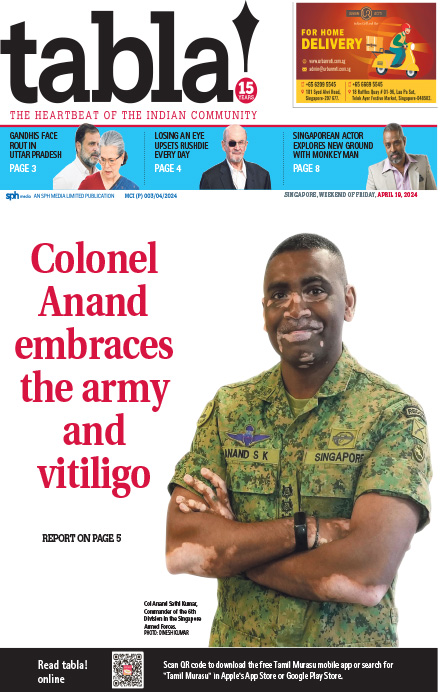V.K. SANTOSH KUMAR
When Singaporeans cast their ballots today in South-east Asia's first Covid-19 pandemic era general election, they will choose between the region's longest-ruling party and one of 10 smaller opposition parties which hope to make a mark in Parliament.
The spirited, high-octane contest since campaigning officially began on June 30 has belied the city-state's reputation for placid politics owing to the uninterrupted rule of the People's Action Party (PAP), which has won every election since 1959, when Singapore gained self-rule from Britain.
What sets this election apart isn't just that it is being held amid a public health crisis with altered ground rules for campaigning.
No political rallies were held during the nine-day campaign period due to safe distancing requirements and restrictions on large gatherings, forcing parties to rely on virtual outreach, walkabouts and door-to-door visits.
Candidates greeted voters with fist bumps and people will be wearing masks at polling stations.
The impact of Covid-19 on jobs and incomes has been topmost on the minds of voters, which is also what any leader or government must focus on for Singapore after the General Election is over, said People's Action Party secretary-general Lee Hsien Loong on Wednesday.
"This is one of the reasons I decided to call the elections now, so that we can clear our minds and focus on these big things which everybody considers important, and which are, in fact, the key issues in front of Singapore," said Mr Lee, who is also the Prime Minister.
Political analysts expect the PAP to keep its overwhelming majority in Parliament, where it held 83 out of the 89 seats.
The test will be whether it can retain the 69.9 per cent share of the vote it received in 2015.
The PAP's old as well as new candidates have mostly been received warmly by voters.
But there is also a feeling at the ground level that it may not be a cakewalk for them.
In 2015, the feel-good vibe following the SG50 celebrations and the death of founding Prime Minister Lee Kuan Yew helped swing votes the PAP's way.
This time, the health and economic crisis following the Covid-19 outbreak has meant that jobs, cost of living, income, retirement security and the future are on people's minds.
Some are upset and this may erode the PAP's vote count.
Mr Lee and other PAP leaders have reiterated during the campaign that they are the best team to take Singapore out of the crisis as they have the experience and means to shape policies and carry them out.
But the question is whether the voters are convinced of their abilities and will give them a strong mandate to steer Singapore forward in a turbulent world.
The election is also pivotal for Mr Lee, 68, who has signalled his intention to step down as party chief and prime minister before turning 70 in 2022 and hand over power to a new team of leaders, known as the PAP's fourth generation, or 4G.
Mr Heng Swee Keat, 58, the Deputy Prime Minister and Finance Minister, is his designated successor.
Some analysts believe the referendum will be a comment on the PAP's 4G team. The party, nevertheless, will consider a repeat of its 2015 electoral showing a triumph. The opposition parties believe a check on the Government is needed in Parliament.
The new Progress Singapore Party (PSP) wants greater accountability and transparency, while the Singapore Democratic Party is pushing to suspend the goods and services tax and introduce retrenchment benefits and regular income for retirees.
The Workers' Party (WP) is calling on voters to deny the PAP a clean sweep. It has argued that its presence in Parliament will help improve policies and build a better future for Singaporeans.
WP's leader Pritam Singh, 43, wants the opposition parties to win a third of Parliament's seats to better check the PAP.
This view has resonated well with a growing number of younger voters.
The three biggest opposition parties will surely put up a stiff fight in several constituencies.
The toughest fights are likely at Sengkang GRC, which includes the former Punggol East SMC which WP briefly held following a 2013 by-election; East Coast GRC, where Mr Heng will be helming the PAP team; and West Coast GRC, where PSP leader and former PAP backbencher Tan Cheng Bock is up against Ministers S. Iswaran and Desmond Lee.
The PAP's 93 candidates are up against 99 challengers - of whom one is an independent.
They are contesting 17 multi-seat constituencies, meant to ensure the representation of ethnic minorities, and 14 single-seat constituencies.
Changes to the Non-Constituency Member of Parliament (NCMP) scheme will come into force after this election, guaranteeing the presence of a maximum of 12 opposition lawmakers in the legislature regardless of the election result.




